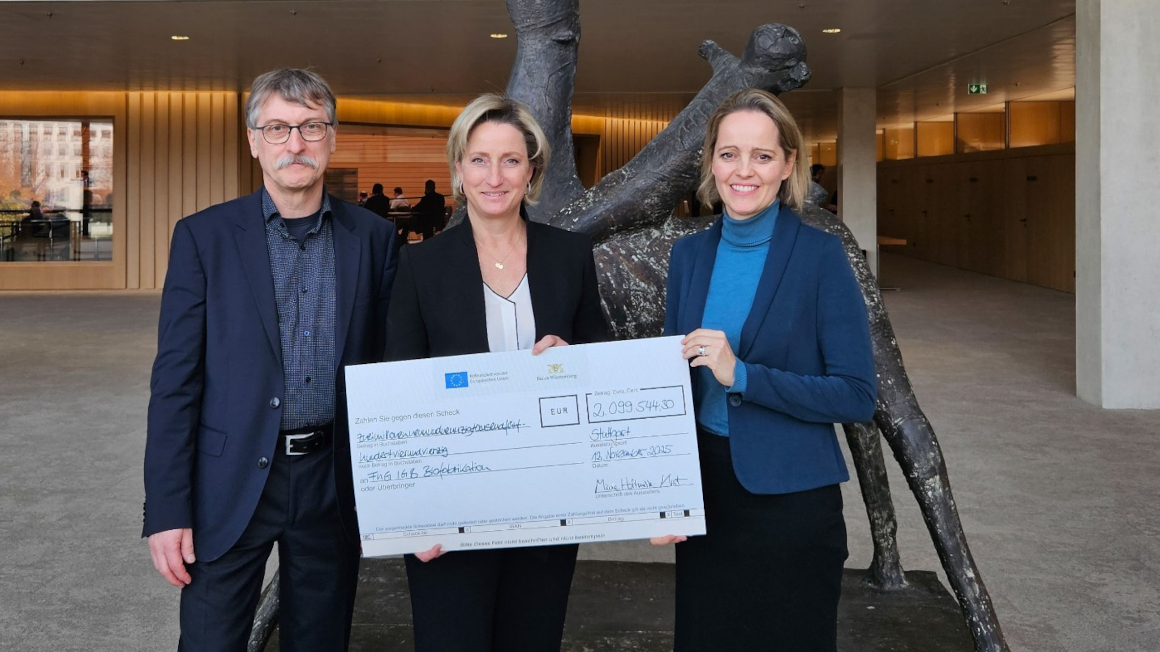The strategy: The roadmap as the goal
In 2010, the Federal Ministry of Education and Research (BMBF) launched the initiative „Nächste Generation biotechnologischer Verfahren – Biotechnologie 2020+“ ("Next Generation of Biotechnological Processes - Biotechnology 2020+") together with major research organizations and universities. This initiative succeeded in bringing together a wide variety of relevant players from science and industry. A roadmap emerged from a strategy process, which in turn formed the basis for new funding measures for the future of biotechnology. In total, the BMBF has invested around 121 million euros in 118 research projects within the framework of Biotechnology 2020+.
In 2010, the Federal Ministry of Education and Research (BMBF) launched the initiative „Nächste Generation biotechnologischer Verfahren – Biotechnologie 2020+“ ("Next Generation of Biotechnological Processes - Biotechnology 2020+") together with major research organizations and universities. This initiative succeeded in bringing together a wide variety of relevant players from science and industry. A roadmap emerged from a strategy process, which in turn formed the basis for new funding measures for the future of biotechnology. In total, the BMBF has invested around 121 million euros in 118 research projects within the framework of Biotechnology 2020+.
In order to tap the full potential of biotechnological production processes, the development of novel processes is necessary. Germany's expertise in the engineering sciences and molecular biosciences was seen as a promising starting point for a new funding initiative to bring the two sides closer together.
Researchers and funding organizations had come to the conclusion that the full potential of biotechnological processes for industrial production could only be tapped if two things were achieved: On the one hand, known processes must find their way into practice faster than before, and on the other hand, entirely new processes must be developed. This requires interdisciplinary cooperation between biologists, engineers, chemists and materials scientists.
To lay the foundation for such an interdisciplinary dialogue, the BMBF launched the long-term strategy process "Next Generation of Biotechnological Processes - Biotechnology 2020+" in 2010. Together with the major research organizations Fraunhofer Society, Helmholtz Association, Max Planck Society and Leibniz Association as well as the universities, the BMBF has brought together the relevant actors in a structured discussion process. For biologists and engineers, but also chemists, biophysicists and computer scientists, this has created a platform for increased interdisciplinary cooperation.
Of crucial importance was the willingness of research organizations and universities for great commitment. At the beginning of 2010, the Fraunhofer Society, the Max Planck Society, the Helmholtz Association and the Leibniz Association agreed on a joint Memorandum of Understanding.
The official start was then marked by a congress with around 200 participants on 10 July 2010 in Berlin's Radialsystem, which was opened by Helge Braun, the current head of the Chancellery and former Parliamentary State Secretary in the BMBF. In the phase up to 2013, technical milestones were worked out at annual congresses and in expert discussions, and the research and development requirements for their realization were derived. These results were condensed into a roadmap of the most important basic technologies for the biotechnology of the future.
Based on this roadmap, a BMBF funding measure on "Basic technologies for a next generation of biotechnological processes" was launched in 2011. This supports fundamental research projects that could lead to leapfrog innovations. In other words, the focus is on processes that go far beyond the established and that promise broad application potential in the long term.
The official kick-off of the strategy process was a congress with around 200 participants on 10 July 2010 in Berlin's Radialsystem, opened by Helge Braun, now Head of the Chancellery, formerly Parliamentary State Secretary at the BMBF. At the annually recurring congresses and in technical discussions with experts, technical milestones were worked out in the phase up to 2013 and the research and development needs for their realisation were derived. These results were condensed into a roadmap of the most important basic technologies for the biotechnology of the future.
Based on this roadmap, a specific BMBF funding measure on "Basic Technologies for a Next Generation of Biotechnological Processes" was launched in 2011. This supports basic research projects that could lead to leap innovations. In other words, it is about processes that go far beyond the established and that promise broad application potential in the long term.
Page 2 of 4
Basic technologies for the biotechnology of the future
The aim of the funding measure "Basic technologies for the next generation of biotechnological processes", which was launched in 2011, was not the gradual further development of known biotechnological production processes, but the creation of the basis for novel processes that cannot yet be realized on a production scale. To this end, explorative, original and high-risk research approaches were to be pursued. The focus was on potential leapfrogging innovations in biotechnology, which could be assigned to four subject areas: universal reaction compartments, functional components, process energy and molecular measurement and control technology.
When the last of the 113 sub-projects expires in March 2021, a total of around 110 million euros in funding will have been provided. A special feature were the four different formats of project funding: There were a total of nine individual projects with a term of two years. Also, 18 research tandems were supported in which two individual researchers from very different scientific disciplines worked together. Furthermore, there were 17 collaborative projects with a duration of up to three years. Three junior research groups were funded over a period of six years.
The diversity of the approaches pursued was - and still is - considerable. For example, several projects sounded out the future potential of electrobiotechnology. In this field, the metabolism of microorganisms is driven by electricity. Among other things, microorganisms can use it to produce organic compounds such as chemicals or fuels from the climate gas carbon dioxide. Bioelectrochemical processes are not only considered to be more environmentally friendly, they may also help to make production more cost-efficient. Other funded research projects also focused on carbon dioxide as a C1 raw material source. They aimed to simulate photosynthesis processes in the laboratory and thus convert light energy and CO2 into high-energy chemical compounds. Other research groups have done research on combining biocatalysts with chemocatalysts and thus interlinking these worlds of catalysis more closely than was previously possible.
Page 3 of 4
The major projects of the research organizations
The four major research organizations Fraunhofer Society, Helmholtz Association, Max Planck Society and Leibniz Association each participated with their own research networks in the development of the next generation of biotechnological processes within the framework of "Biotechnology 2020+". The research organizations each contributed their own budgets for these major projects. The BMBF contributed a total of 41 million euros to the projects.
The four projects at a glance:
Helmholtz Research Network Molecular Interaction Engineering (MIE)
Scientists from Forschungszentrum Jülich, the Karlsruhe Institute of Technology (KIT) and Helmholtz-Zentrum Geesthacht worked on combining modern tools of biotechnology and surface technology. The aim was to create hybrid systems that could be implemented as "printable biotechnology" in thin layers on technical surfaces or in the form of microfluidic units. The industrial model: printed circuits in electronics. The interdisciplinary alliance brought together methods from biotechnology, structural biology, materials science, process technology and computer simulation. Duration 2013-2018.
Leibniz-Research Cluster (LRC) – Bio/Synthetic multifunctional micro production units - Novel approaches to drug development
This research network unites five Leibniz Institutes in Jena, Dortmund, Dresden, Halle and Saarbrücken. The interdisciplinary network of natural product researchers, materials researchers and bioanalysts aims to develop new bioactive substances for medicine, food or the agricultural industry with the help of so-called microproduction units. Processes such as synthetic biology, microfluidics and nanotechnology as well as cell-free biosyntheses are used to reproduce the building blocks of natural products. A junior research group has been established for this purpose at each Leibniz Institute. Duration 2015-2020.
https://www.leibniz-research-cluster.de
Fraunhofer Society: Biomolecules off the assembly line
Making cell-free bioproduction suitable for industrial use - this was the focus of the Fraunhofer joint project "Biomolecules off the assembly line" from 2011 to 2014. Employees from eight Fraunhofer Institutes developed model systems for cell-free bioproduction plants. Initially, novel cell harvesting and digestion processes from cells were developed. The resulting lysates can be filled with amino acids and genetic material in order to initiate the synthesis of certain proteins cell-free. Model reactors based on microfluidic systems or selectively permeable membrane walls were also developed. In this way, synthesis building blocks or energy can be continuously supplied. Duration 2011-2014.
www.zellfreie-bioproduktion.fraunhofer.de
MaxSynBio – Max Planck Research Network for Synthetic Biology
Up to now, biotechnology has been dependent on living organisms, which are very complex and difficult to control, even in the case of microorganisms. A cell reduced to a minimum of vital components as a platform for the production of a desired product could one day solve this dilemma. But what is the minimum molecular configuration of a viable cell? The Max Planck Society has established an interdisciplinary research network involving a total of nine Max Planck Institutes and one university - the research network "MaxSynBio".
The goal of MaxSynBio is to develop the scientific basis for the bottom-up synthesis of artificial cellular systems from biological functional modules, which could be tailor-made for biotechnological applications in the long term. Initially, minimal units such as protein domains, proteins or other biomimetic macromolecules and protein networks up to synthetic cellular systems will be built up step by step. The research program includes accompanying ethical research, since Synthetic Biology inevitably raises many questions about artificial life forms and their use in technological processes. Duration 2014-2020.
Page 4 of 4
Research Award
Since 2012, the BMBF has awarded a research prize every two years as part of the Biotechnology 2020+ program. It was aimed at scientists whose outstanding research results have been achieved at universities, research institutions or even in companies and are highly relevant for the development of a next generation of biotechnological processes. The research prize was intended to make scientific breakthroughs visible. The award winners have been and still will be funded for five years by a research group with which they can continue to work on new biotechnological production processes.
|
Year |
Award Winner |
Subject (Title simplified) |
|
2012 |
Dr. Falk Harnisch |
Microbial bioelectrotechnology for the production of basic and fine chemicals |
|
2012 |
Prof. Dr. Udo Kragl |
Use of enzymes in ionic liquids |
|
2014 |
Dr. Stefan Schiller |
|
|
2016 |
Prof. Dr. Ulrich Schwaneberg |
Using synthetic biofilms to make production organisms useful in organic solvents |
|
2016 |
Dr. Kirstin Gutekunst |
Transforming cyanobacteria into efficient hydrogen factories |




